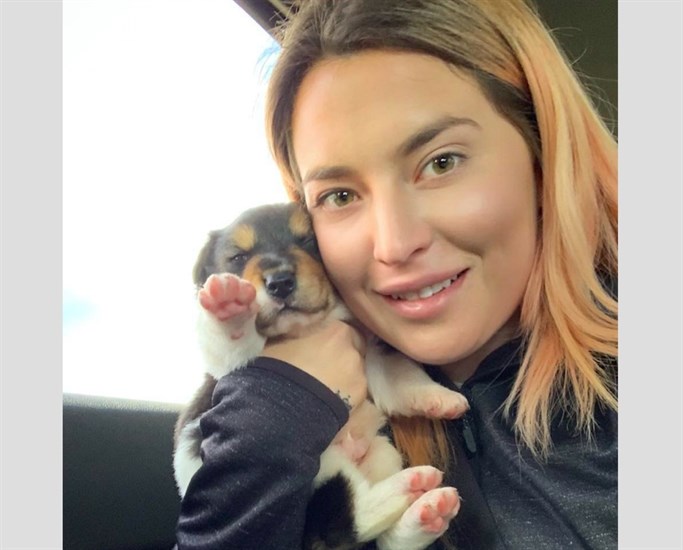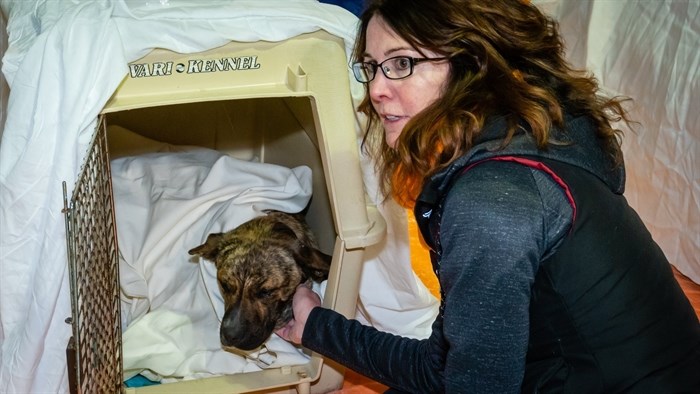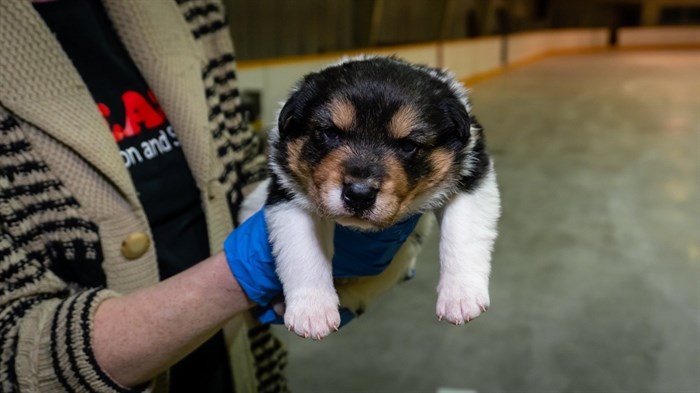
Shelby Langelaan, founder of West Coast Animal Advocacy with a dog rescued from Ebb and Flow, Manitoba.
Image Credit: Submitted/West Coast Animal Advocacy
January 07, 2020 - 6:30 AM
There are plenty of organizations around that rescue dogs in distress and try to find them good homes.
Some of these groups bring the animals in from California, Mexico or other countries.
But Lake Country resident Shelby Langelaan, who founded West Coast Animal Advocates (originally Paws for Empathy) in 2016, wants to focus closer to home.
“What people don’t realize is that, here in B.C., and across Canada, we have dog culls that happen regularly,” she told iNFOnews.ca. “We have dogs that are suffering outside because they don’t have homes. I don’t think people in B.C. know that because it doesn’t get the media coverage that you see on Facebook with the California dogs.”
Facebook groups in California do a great job of marketing dogs who, they may claim, are just hours away from death, she said.
Langelaan is heading to Dog Creek in Manitoba on Jan. 17 to deliver dog houses, food and education. It will be her third trip to Manitoba.
“You can rescue dogs as much as you want and keep pulling them out of communities but, unless you stop where the source is coming from, you’re just going to go back two weeks later because they’ve got another litter of puppies,” Langelaan said. “That’s why spay and neuter is so important.”
Last spring she worked with Dr. Keri Hudson Reykdal (known as Dr. Keri: Prairie Vet on the Discovery Channel) who spayed and neutered 45 dogs in two days.
“The primary reason for our trips is to work with communities to try to develop dog control guidelines so you can allow only two dogs per household and they have to be tied up, they have to be provided with food and shelter and there’s repercussions if they don’t follow those rules,” Langelaan said.

Karen Grange from Small Dog Rescue B.C. comforting one of the dogs post spay in Ebb and Flow, Manitoba.
Image Credit: Submitted/Tyrone Hofer
Last winter she went to Crane River in Manitoba to deliver dog houses, dog food and other material, in partnership with other organizations. They rescued 18 dogs but found another eight that had died. She also saw children with inadequate clothing.
“A lot of these First Nations communities don’t even have the ability to feed themselves,” she said. “They don’t have warm gloves, warm shoes, warm clothes. So, maybe someone brings a dog in and their friend down the road breeds with their dog and they have no resources to spay, neuter or do any type of veterinary care so they end up with a stray community completely out of control. That’s where you get the stories of stray dogs ganging up and attacking or killing someone because these people do not have the resources.”
That's why, for this trip, Langelaan is asking for donations of gloves, boots and winter clothing she can take along to hand out as needed. Residents who cannot afford warm clothing for their children also can't afford to spay or neuter their dogs.
While it may be too soon to fully evaluate the success of her efforts, she has heard that a planned cull of dogs in Crane River did not happen so she’s optimistic residents there are learning better dog care and control.
West Coast Animal Advocacy has raised $20,000 so far through a number of fundraising activities and has used that mostly on veterinary bills while working with rescue and other "reputable" organizations.
“We wanted to have an organization that could assist multiple groups in the Lower Mainland and Okanagan and all across Canada,” Langelaan said. “With rescue groups, typically, they’re kind of working side by side but we want to be a link and help them all work together. Someone needed to fill in the blanks there and we decided we had the skill sets and connections to do that.”

One of three puppies rescued from Ebb and Flow, Manitoba.
Image Credit: Submitted/Tyrone Hofer
There are so many dog rescue groups coming and going in B.C. that it’s hard to keep track of them, although the Lower Mainland-based Paws for Hope is trying.
Executive Director Kathy Powelson told iNFOnews.ca that, at last count, there were about 220 shelter and rescue groups in the province, in addition to the SPCA.
She’s concerned about unethical groups that may bring large numbers of dogs into the country without proper veterinary examinations. She cited cases of dogs coming in from China with forms of distemper that are not only untreatable in Canada but can spread to wildlife.
Dogs can also be adopted that appear to be calm when first brought in but, once they decompress from travel, can turn out to be aggressive towards other pets or children.
If the new owners try to go back to the rescue organization it may have disappeared or will react with hostility. Some are known to have forged health and age certificates, Powelson said.
There are no standards on how the rescue groups conduct themselves so Paws for Hope is in the process of developing a certification process.
They’ve drafted guidelines that will be put on their web page soon for comment from animal rights and rescue groups. The goal is to have the guidelines in place and the voluntary certification process started by the end of the year.
Look here for more on what's needed by West Coast Animal Advocates for the upcoming Manitoba trip.
For people concerned about how reputable a dog rescue organization might be, Langelaan also suggested checking out the hugabull web site here.
To contact a reporter for this story, email Rob Munro or call 250-808-0143 or email the editor. You can also submit photos, videos or news tips to the newsroom and be entered to win a monthly prize draw.
We welcome your comments and opinions on our stories but play nice. We won't censor or delete comments unless they contain off-topic statements or links, unnecessary vulgarity, false facts, spam or obviously fake profiles. If you have any concerns about what you see in comments, email the editor in the link above.
News from © iNFOnews, 2020